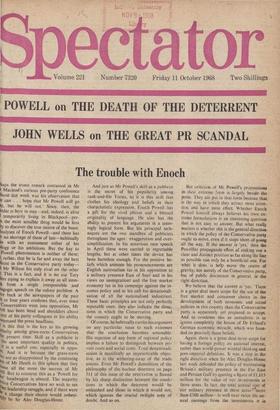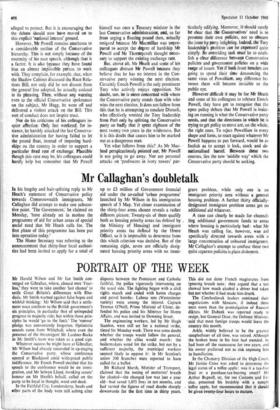The trouble with Enoch
haps the truest remark contained in Mr It Macleod's curious pre-party conference urst last week was his observation that e can . . . hope that Mr Powell will go y, but he will not.' Since, then, ' the nder is here to stay—and, indeed, is alive temporarily living in Blackpool—per- the most sensible thing would be first y to discover the true nature of the beast. nalyses of Enoch Powell—and there has n no shortage of them of late—habitually in with an assessment either of his Dlogy or his ambitions. But the key to Powell phenomenon is neither of these; 1, rather, that he is far and away the best )licist in the Conservative party today- ll Mr Wilson his only rival on the other . This is a fact, and it is no use Tory lers trying to explain it away as all stem- tit from a single irresponsible and lagogic speech on the colour problem. A tee back at the newspapers of the past * or four years confirms that, ever since Conservatives went into opposition, Mr well has been head and shoulders above rest of his party colleagues in his ability ''ammand the press headlines. I is this that is the key to his growing parity among grass-roots Conservatives e present time. Skill as a publicist is the most important quality in politics, it is a useful one, especially in oppo- )h• And it is because the grass-roots les are so disappointed by the continuing Lire of Mr Heath in this sphere that they tome all the more the success of Mr 'ell. But to construe this as a `Powell for let.' bandwagon is absurd. The majority 'live Conservatives have no wish to see htir leadership struggle, and if there were
a change their choice would unhesi- tigly be Sir Alec. Douglas-Home. And just as Mr Powell's skill as a publicist is the secret of his popularity among rank-and-file Tories, so it is this skill that clothes his ideology and beliefs in their characteristic expression. Enoch Powell has a gift for the vivid phrase and a blessed originality of language. He also has the ability to present his arguments in a seem- ingly logical form. But his principal tech- niques are the two standbys of publicists throughout the ages: exaggeration and over- simplification. In his notorious race speech in April these were carried to regrettable lengths, but at other times the device has been harmless enough. For the positive be- liefs which animate his pronouncements are English nationalism (as in his opposition to a military presence East of Suez and in his views on immigration) and the free market economy (as in his campaign against the in- comes policy and in his call for denationali- sation of all the nationalised industries). These basic principles are not only perfectly reputable ones; they also indicate the direc- tions in which the Conservative party and the country ought to be moving.
Of course, he habitually carries his argument on any particular issue to such extremes that the conclusion becomes untenable. His rejection of any form of regional policy implies a failure to distinguish between pri- vate costs and social costs. Total denationali- sation is manifestly an impracticable objec- tive, as is the withering-away of the trade unions. Even Mr Powell's demolition of the philosophy of the •nuclear deterrent on page 511 of this issue of the SPECTATOR is flawed by his sharp distinction between the condi-, tions in which the deterrent would be unleashed and those in which it would not, which ignores the crucial twilight area of doubt. And so on. But criticism of Mr Powell's propositions in their extreme form is largely beside the point. They are put in that form because that is the way in which they attract most atten- tion and have most effect. Whether Enoch Powell himself always believes his own ex- treme formulations is an interesting question that is not easy to answer. But what really matters is whether this is the general direction: in which the policy of the Conservative party ought to move. even if it stops short of going all the way. If the answer is 'yes,' then the Powellite propaganda effort of staking out a clear and distinct position as far along the line as possible can only be a beneficial one. For what it does is help move the centre of gravity, not merely of the Conservative party. but of public discussion in general. in the right direction.
We believe that the answer is 'yes.' Them is a great deal more scope for the use of the free market and consumer choice in the development of both economic and social policies in this country than the Conservative party is apparently yet prepared to accept And to condemn this as unrealistic is to ignore completely the lesson of Dr Erhard's German economic miracle, which was fon, ded on precisely these beliefs.
Again, there is a great deal mOre scope for basing a foreign, policy on tuitional interest, rather than world-power wishful thinking and post-imperial delusions. It was a step in the right direction when Sir Alec Douglas-Home last week defended the policy of maintaining Britain's military presence in the Far East and Persian Gulf by quoting a figure of £1,115 million for the value of our investments in those areas. In fact, the total annual cyst of our military presence in these areas —twice than £309 million—is well over twice the an- nual earnings from the investments it is alleged to protect. But it is encouraging that the debase should now have moved on to this engikit 'national interest' ground.
However, Mir Powell remains anathema to a considerable section of the Conservative hierarchy. This is not simply because of the enormity of his race speech, although that is a factor. It is oho because they have found him an almost impassible person to work with. They complain, for example, that, when the Shadow Cabinet discussed the Race Rela- tions Bill, not only did he not dissent from the general line adopted, he actually assisted in its phrasing. Then, without any warning even to the official Conservative spokesman on the subject, Mr Hogg, he went off and delivered a violent attack on the Bill. This sort of conduct does not inspire trust.
Nor do his criticisms of his colleagues in- spire affection. Only fast weekend, for in- stance, he harshly attacked the last Conserva- tive administration for having failed to let the pound float, instead of imposing hard- ships on the country in order to support a particular feted rate of exchange. Plausibk though this case may be, his colleagues could hardly help but remember that Mr Powell himself was once a Treasury minister in the last Ceamervative administration, and, so far from urging a floating pound then, actually resigned because Mr Macmillan was unpre- pared to accept the degree of hardship Mk Powell and Mr Thorneycroft thought neces- sary to support the existing exchange rate.
But, above all, Mr Heath and some of his colleagues distrust Mt Powe* because they believe that he has no interest in the Con- servative party winning the next election. Certainly Enoch Powell is the only prominent Tory who actively enjoys opposition. No doubt, too, he is Mite concerned with where the Conservative party stands than with who wins the next election. It does not follow from this that he is attempting to emulate Disraeli, who effectively wrested the Tory leadership from Peel only by splitting the Conservative party so badly that if slit eighteen of tire next twenty-two years in-the wilderness. But it is this doubt that causes him to be marked out as a dangerous man.
Yet what follows from this? As Mr Mac- leod perspicaciously pointed out, Mr Powell is not going to go away. Nor are personal attacks on 'professors in ivory towers' par- titularly edifying. Moreover, it should surely be' clear that the Conservatives' need is to promote their own policies, not to obscure the issue by party infighting. Indeed, the Tory leadership's yaloblem can be expressed' quite simply. Its overriding task must be to estab- lish a clear difference between Conservative policies and gevernment polides on a wide range of issues. ireft if both frorft 1111111adS are going to spend their time denouncing the same virus of POwellis4#P, any difference be- tween them will become invisible to the public eye.
However clifficult it may be for 1Wr Wath and some of his colleagues to tolerate Enoch Powell, they have got to recognise that the open policy debate that Mr Powell is insist- ing on running is what the Conservative party needs, and that the directions in which he is trying to get policy to Move are, on the whole, the right ones. To reject Powellism in every shape and form, to react against whatever Mr Powell happens to put forward, would be as foolish as to accept it lock, stock and de- nationalised Witt ietween these two courses, lies the new 'middle way' which the Conservative party should be seeking.







































